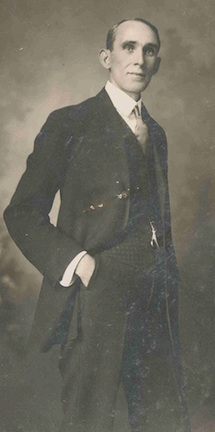Discovering New Civil War Ancestors

Otis Jack, born the third year of the Civil War, was my grandmother’s father. His father, John Jack, born in 1810, sired five sons and five daughters, including Otis. As a young man, Otis accidentally shot his own left arm off while cleaning a shotgun. He was 53 when my grandmother was born, the youngest of three girls.
Recently, my father’s sister came across an online biography that profiled one of Otis’s brothers, Rev. Chambers T. Jack. “Our subject is an earnest, energetic, patriotic and Christian man,” the biography said.
As it turns out, I now have a couple new Civil War ancestors.
Chambers enlisted with the 104th PA in 1865—men from Bucks and Berks and Schuylkill counties. He served “chiefly under the Provost Marshal, at Norfolk, Va,” although the biographer noted he “was present at the siege of Petersburg, and after about six months’ service was honorably discharged at the close of the war, in August, 1865, and returned home.” The bio transposed the order of events, though: the unit took part in operations against Petersburg and Richmond until mid-April and then transferred to Norfolk, where they stayed until mustered out in August.
Chambers later went on to join the Baptist ministry, eventually settling in Linesville, PA, where he served as minister until 1884 when, debilitated by a stroke, he finally resigned. “Since his return from the army,” the biography said, “his health has shown itself to have been much impaired during the service.”
Another of Otis’s older brothers, James W. Jack, older than Chambers, also served during the war—for three years—first with the 78th PA and later with the 104th PA. If he enlisted the regiment first formed, he saw action with the Army of the Cumberland, first moving here and there before finding themselves at Stones River, Tullahoma, Chickamauga, Chattanooga, and the Atlanta Campaign. What a haul that must’ve been. When original enlistments expired in October 1864, the original members of the unit were shipped to Pittsburgh, PA, to be mustered out—which would’ve put James back in Pennsylvania in time to reenlist with his younger brother, Chambers, in the 104th. James made it thorough that tour of duty, too, and was honorably discharged. According to Chambers’ bio, James “returned home without a wound.”
So far, this is all I know—scraps of info from an online bio sent to me by my aunt and some subsequent internet research. That still makes it a lot more than I ever knew about Otis’s family. And it now gives me two more Civil War ancestors I never knew I had. I have descended from families of immigrants, so for most of my life, I didn’t realize I had any Civil War connections at all. However, in August 2016, I shared the story of my great-great-great grandfather, Sheldon Appleby, on my mother’s side. Now I have Civil War relations on my father’s side, too.
More stories to investigate!
Chris,
It is awesome to have a personal connection to the war! Great discovery!
2d Lt. George W. Jack, 131 PA; Capt. John H. Jack, 2d PA Reserves, transferred to 186th PA in 1864; Lt. Col. John T. Jack, 56th PA; Col. Joseph Jack, 168th PA; 2d Lt. Joseph L. Jack, 201st PA; 1st Lt. Josiah Jack, 69th PA (killed in action at Spotsylvania, May 12, 1864); 2d Lt. Samuel H. Jack, 6th Maryland (US); Asst. Surgeon William Jack, 57th PA; transferred to 84th PA; Capt. William S. Jack, 78th PA, died of wounds February 5, 1863, received at Stones River, TN.
It is interesting how these things come to pass, and where they lead. Several years ago I casually mentioned to my sister-in-law (Sandy) that I didn’t know much about my father’s mother, who had died in the 1930s. Sandy is an ace at finding genealogical stuff on the Internet, and a few weeks later she sent me a PDF of the obituary—which mentioned that my grandmother was a member of the UDC. An inquiry to a friend in the UDC put me in touch with someone who provided me with the basis for my grandmother’s membership, which also informed us that a surname along that part of our family tree had been badly mangled when passed down to me, thus explaining why that line of my ancestry was a dead-end.